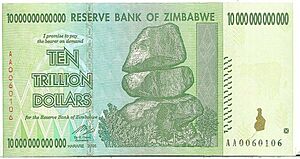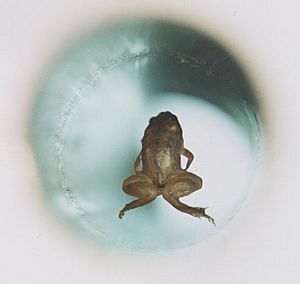Ig Nobel Prize facts for kids
The Ig Nobel Prize is a funny award given out every year since 1991. It celebrates scientific discoveries that first make people laugh, and then make them think. The name "Ig Nobel" sounds like "ignoble," which means not honorable, and it's a playful twist on the famous Nobel Prize.
These awards are organized by a science humor magazine called Annals of Improbable Research. Real Nobel Prize winners often present the Ig Nobel awards at a special ceremony. Winners even get a special "prize" – a 10 trillion Zimbabwean dollar banknote, which is mostly a collector's item!
Contents
What Are the Ig Nobel Prizes?
How the Awards Started
The Ig Nobel Prizes were created in 1991 by Marc Abrahams. He is the editor of the Annals of Improbable Research magazine and has hosted every award ceremony. The awards were first given for discoveries that "cannot, or should not, be reproduced."
Each year, ten prizes are given in different fields. These include categories like physics, chemistry, medicine, literature, economics, and peace, just like the Nobel Prizes. They also have other fun categories such as public health or biology.
Why These Awards Matter
Most of the time, the Ig Nobel Prizes highlight real scientific studies that have a funny or surprising side. For example, one award went to research about the "five-second rule." This is the silly idea that food dropped on the floor is safe to eat if you pick it up within five seconds.
Sometimes, the awards are also a way to playfully criticize certain ideas. For instance, some awards have been given for homeopathy research or for decisions about teaching evolution in schools.
A cool fact is that Sir Andre Geim won an Ig Nobel Prize in 2000 for making a frog float with magnets. Then, in 2010, he won a real Nobel Prize in physics for his work on graphene. As of 2025, he is the only person to have won both an Ig Nobel and a Nobel Prize!
The Award Ceremony

Real Nobel Prize winners usually present the Ig Nobel awards. The ceremony used to be at MIT and then moved to Sanders Theater at Harvard University for many years. From 2020 to 2023, the event was held online because of the COVID-19 pandemic. In September 2024, the ceremony returned to MIT.
The event has many funny traditions. One is "Miss Sweetie Poo," a little girl who shouts, "Please stop: I'm bored!" if speakers talk for too long. The ceremony always ends with a funny message: "If you didn't win a prize—and especially if you did—better luck next year!"
Another long-standing tradition is throwing paper planes onto the stage. For many years, Professor Roy J. Glauber was the "Keeper of the Broom." He would sweep the stage clean of all the paper airplanes. In 2005, he couldn't attend because he was traveling to Stockholm to accept his real Nobel Prize in Physics!
Sharing the Fun
The Ig Nobel ceremony is recorded and broadcast on National Public Radio in the US. It's also shown live on the Internet. The recording is played every year on the Friday after US Thanksgiving on a radio show called Science Friday. The audience often chants the name of the show's host, Ira Flatow.
Two books have been published about some of the winners: The Ig Nobel Prize and The Ig Nobel Prize 2. The second book was later renamed The Man Who Tried to Clone Himself.
Since 2003, an Ig Nobel Tour has been a yearly part of National Science Week in the United Kingdom. The tour has also visited Australia, Denmark, Italy, and the Netherlands.
Why These "Funny" Discoveries Matter
An article in The National in 2009 said that even though Ig Nobel Awards seem to make fun of silly research, sometimes this "silly" research leads to important discoveries.
For example, in 2006, a study won an Ig Nobel Prize for showing that a mosquito that carries malaria (Anopheles gambiae) is attracted to the smell of Limburger cheese and human feet. Because of this finding, scientists were able to use cheese-baited traps to help fight malaria in Africa.
Also, Andre Geim, who won an Ig Nobel for making a frog float, later won a real Nobel Prize for his work on graphene. His frog levitation research even helped inspire a lunar gravity research facility in China by 2022. This shows that even funny experiments can lead to big scientific ideas!
See also
 In Spanish: Premio Ig Nobel para niños
In Spanish: Premio Ig Nobel para niños
- List of Ig Nobel Prize winners
- Darwin Awards
- Golden Raspberry Awards – awards for bad movies
- Bulwer-Lytton Fiction Contest – an award for bad writing
- Bookseller/Diagram Prize for Oddest Title of the Year – an award for books with unusual titles
- Pigasus Award – exposing fake psychic claims
- Golden Fleece Award – award for waste of government funds
- Foot in Mouth Award – an award for confusing comments by public figures
 | Delilah Pierce |
 | Gordon Parks |
 | Augusta Savage |
 | Charles Ethan Porter |


